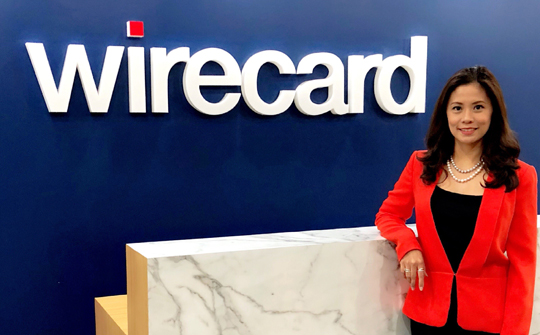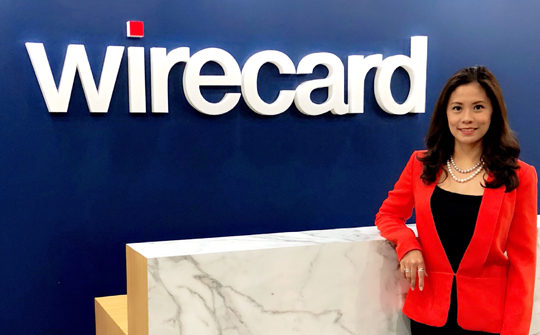 Wirecard Philippines country manager Martha Aguila-Borja
Wirecard Philippines country manager Martha Aguila-Borja“The Philippines is well-positioned for digital transformation,” says Martha Aguila-Borja, country manager of Wirecard Philippines, a unit of German financial technology company Wirecard AG.Borja says to take advantage of recent developments, companies should be able to facilitate payments in a digitally-driven world.With a high smartphone penetration and still a large unbanked population, the Philippines is considered fertile ground for fintech innovation. However, the country faces roadblocks on its cashless journey with slow digital payments penetration. Data show that 99 percent of all payment transactions in the country are still settled in cash.This is where Wirecard hopes to make a difference. “Wirecard, as a global innovation leader in payment solutions and acceptance, will play a key role in enabling BSP’s [Bangko Sentral ng Pilipinas] National Strategy for Financial Inclusion. We are one with BSP’s thrust to grow digital transactions from 1 percent to 20 percent by 2020 and it is Wirecard’s commitment to help our partners flourish in this age of digital transformation,” says Borja, who has worked for various financial institutions such as Bank of America, ABN-AMRO Bank and Citibank over the past 20 years before joining Wirecard in 2018.Seasoned bankerBefore joining Wirecard, Borja spent 14 years in Citibank’s consumer business, most recently as the senior vice president for retail marketing for credit payment products and the head of merchant acquiring business. Wirecard makes online payment for merchants and consumers transparent and secure and offers end-to-end services for merchants, airlines and travel operators, banks, telecom operators and service providers.Wirecard established its Philippines presence in 2017 and was registered as Wirecard e-Money Philippines Inc. Borja says the business was founded on the back of two major acquisitions from Citibank. The first was the acquisition in March 2017 of Citi’s Prepaid Card Services, which was already one of the leading issuer and program managers in the area of institutional cards. The second deal was the regional acquisition of Citigroup’s prepaid card business and customer portfolio for card acceptance in the Asia Pacific region. “This has enabled Wirecard to provide merchants and businesses in the Philippines with payments, issuing and acceptance services,” she says. “This has accelerated Wirecard’s direction towards establishing a worldwide network of service and technology locations while enabling our regional partners to benefit from our established technology and experience.”Digital payments Borja says digital payments in the Philippines saw tremendous expansion last year and are expected to see further growth in 2019. “Most of this can be attributed to the proliferation of mobile technology – which has been a catalyst for change and growth and is largely driving digital payments adoption,” she says.A 2017 study by Visa shows that more than half (53 percent) of Filipinos prefer e-payment methods to cash, up from 46 percent in 2015. The use of mobile wallets has also become increasingly popular among Filipinos.“We can expect to see more cardholders moving towards mobile technology platform. There is strong potential there with contactless payments expected at 15.2 percent and reaching $91.9 billion by 2021,” says Borja.Cashless societyBorja says the Philippine government is now making great strides to steer the country down the path to becoming a cashless society, with the launch of the National Retail Payments System which has played a key role in reaching the unbanked. The NRPS enables easier and real-time interbank transfers, as well as merges the various ARM, mobile money and electronic point-of-sale networks. “But we’re still some ways off being a fully cashless society. Key areas which require continued improvement include infrastructure as well as mindsets to drive wider acceptance usage by both businesses and consumers. At the moment, there is still a significant majority of Filipinos who remain unbanked. Furthermore, slow internet speed and lack of trust in the digital systems hinder its evolution,” she says.Borja wants to see a cultural shift to getting people comfortable with new technology. “As we look forward to 2019, collaboration and innovation is essential – to spur wider acceptance usage of digital payments. The payments ecosystem needs to work towards empowering customers with choice and capabilities that not only digitize payments but make it easier for them to create new and more secure ways to pay. And that means a concerted effort across the government, financial institutions and businesses alike,” she says.Omni-channel experience
Borja says in today’s fast-paced, increasingly digital environment, retailers are facing huge pressure to rapidly innovate and meet the needs of the connected consumer. Results of Wirecard’s International Holiday Shopping Report 2018 show that consumers have high expectations for omni-channel shopping experiences. “In particular, Asian consumers had the highest expectations to have omni-channel shopping experience, with 90 percent saying they were likely to combine channels [mobile, app, in-store or desktop] to shop for their items. The main reason for using this approach was to compare prices,” she says.Borja says Filipinos also tend to use different online platforms to assess purchases. A Path to Purchase report 2017 found that Filipino consumers could make six to seven searches from price comparison websites, product reviews and online videos. However, merging channels between offline and online channels are still a challenge for merchants. E-commerce growth“With e-commerce in the Philippines growing by 30 percent in 2018 and its share of the Southeast Asian market expected to be worth $10 billion by 2025 according to Google and Temasek, we see a tremendous opportunity for businesses that can provide truly omni-channel experience. This will be key to customer satisfaction and retention,” says Borja.Emerging technologies such as artificial intelligence augmented reality and the Internet of Things can also help retailers gain a competitive advantage. She says Alipay tested facial recognition payments at KFC in China while Wirecard launched its Internet of Things shelf which also uses biometric facial recognition. “These innovative financial technologies will continue to disrupt the industry, and we can expect to see cashless payments being integrated further into the customer journey, making the entire shopping experience more seamless than before. Businesses need to evolve the way they interact with customers, offering a seamless omni-channel experience that is fast, convenient and secure,” she says.Omni-channel has become the new shopping standard, says Borja, adding that a Wirecard report found that Asia-Pacific is home to some of the most ‘integrated’ shoppers, with 68 percent likely to make purchases via a desktop, mobile app or mobile site. “To keep up with the evolving consumer, retailers need to evolve and innovate in order to provide better customer experiences. Innovative technologies such as AI and analytics can play a crucial role in harnessing an omni-channel experience, where retailers can leverage insights to make informed decisions catering personalized offerings based on individual needs,” she says.Borja cited, for example, Wirecard’s new click and collect platform which provides merchants with flexible purchase and pick-up option. This means that retailers can provide a positive and seamless customer experience, a key factor for customer retention, she says.Wirecard solutionsBorja says the Philippines has made some positive steps towards embracing digital payments in recent years, driven by telco players and the rise of new technology players which are introducing e-wallets into the economy. “While this obviously provides different options for consumers, more can be done to help businesses make sense of these new options and integrate it into better customer experiences for end-consumers. This is where Wirecard provides invaluable support – where we promote the use of financial technologies among B2B partners to help them with digitizing payments,” says Borja.As an enabler, Wirecard helps banks, money exchange houses, remittance partners and others to provide consumers with the products and the tools to transition from traditional products to one that is cash-lite and eventually go cash-less, she says. This involves providing POS systems to using technology to transform backend operations and processes. Borja says this helps businesses to have greater control of their payments processing as well as improving security in the payments process to reduce risk and potential fraud. “As e-commerce gains greater prominence, we also see a significant opportunity to partner with retailers to help transition their businesses using our omni-channel platform, which will help provide a seamless platform to track various payment interactions across multiple channels,” she says.“Globally, digital and cashless payments are gaining traction and it is an exciting time for us in the Asia Pacific. While we are still in the nascent stages, there are a multitude of opportunities for the region to leap forward in our digital payments journey. Being able to shape what the future of payments will look like is definitely a game-changer. With Wirecard’s established global presence and international partnerships, we are well positioned to support the Asia Pacific in its evolution,” says Borja.
COMMENT DISCLAIMER: Reader comments posted on this Web site are not in any way endorsed by Manila Standard. Comments are views by manilastandard.net readers who exercise their right to free expression and they do not necessarily represent or reflect the position or viewpoint of manilastandard.net. While reserving this publication’s right to delete comments that are deemed offensive, indecent or inconsistent with Manila Standard editorial standards, Manila Standard may not be held liable for any false information posted by readers in this comments section.

